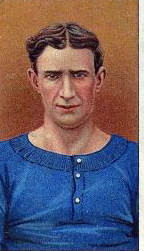If the heatwave continues for another couple of weeks, we could be seeing some strange scores on the opening day of the football season, writes ANTON RIPPON
Playing the game in soaring temperatures is never easy, as even those of us whose career never rose above the Sunday League can testify.

In a bid to write a scholarly piece for sportsjournalists.co.uk on how to beat the heat, I consulted a couple of websites given over to sports science. There was a lot of mumbo-jumbo and physics, a subject that always mystified me at school, and the whole thing seemed to boil down – should that be “up”? – to two things: playing football in very hot weather affects players’ performances; to counteract it, drink lots of water. Well, thanks for that.
So instead, I will use this as a thinly disguised excuse to tell you about a remarkable match that happened a long time ago.
The year was 1906 and it was a very bad one for Manchester City. It began with their star player, Welsh international Billy Meredith, suspended after allegedly offering an Aston Villa player £10 to let City win a vital game.
Then 17 City players, together with the manager, Tom Maley, and several directors, were banned after it was found that the club had “bought” the FA Cup in 1904 with irregular bonuses.
And then came the heatwave.
On the first day of the 1906-1907 season – Saturday, September 1 – Manchester City entertained Woolwich Arsenal at Hyde Road. Because of the mass suspension of their players, City fielded virtually a new team. They also had a new manager, Harry Newbould, a former sprinter, chartered accountant and lately secretary-manager of Derby County. Newbould’s City career was to start in the most astonishing of circumstances.
The temperature inside the stadium that day was 90F in the shade, and one after another, City’s new men began to feel the heat. A crowd of 18,000 saw Arsenal take the lead in the 30th minute through Bob Kyle. Two minutes later, City’s Irvine Thornley fell “prostrate and very ill”, according to one match report. His match was over. Remember, not even a single substitute allowed then, so City were down to 10 men.
Tim Coleman made it 2-0 and then City lost Jimmy Conlin, despite his precaution of playing with a knotted handkerchief covering his head. When the teams took to the field for the second half, City’s Bob Grieve was missing. Losing 2-0, down to eight players – there was nothing in the coaching manual to cover this situation.
Eventually, Conlin returned and then George Dorsett scored for City. But then Dorsett had to retire and City were back to eight players. Arsenal score two more, through Kyle again and Charlie Satterthwaite, before City went down to seven players when Tommy Kelso decided that he could not continue. Finally, Jimmy Buchan disappeared, leaving the home team with only six men on the field. In later times the match would have been abandoned because a team needs at last seven players, but referee A. J. Barker of Hanley, who had officiated in the 1904 FA Cup Final when City beat Bolton Wanderers, carried on. The gallant thin blue line held out, and the final score was 4-1.
Quite why it was Manchester City’s players, and not Arsenal’s, that had suffered so much from the heat has never been understood. Even then, City’s misery was not over. Two days later they played at Everton and although the weather had cooled and they finished with a full complement of players, they still lost – this time 9-1. Incidentally, City’s reserves conceded 14 goals in their first two games. It must have been something in the water.
UPCOMING SJA EVENTS
Mon Sep 9: SJA Autumn Golf Day, including the Phil Sheldon Trophy, at Muswell Hill Golf Club. Details to be announced shortly
Thu Dec 12: SJA 2013 British Sports Awards. Venue and ticket booking details to be announced soon